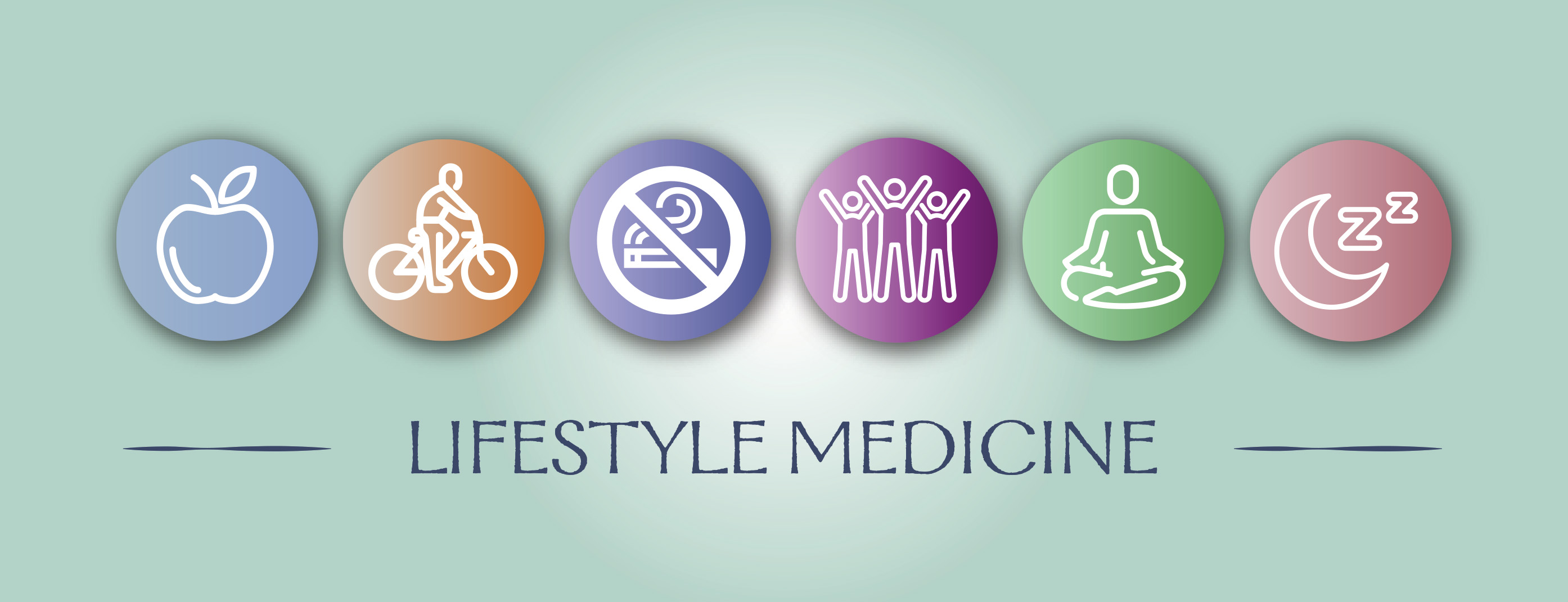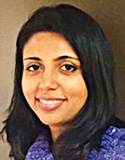BY SANDRA JACOBS, VITAL SIGNS EDITOR AND JENNIFER DAY, DIRECTOR, CHARITABLE FOUNDATION

Illustration by Lisa Resnick

Dr. Michelle Dalal
When MMS member Michelle Dalal, MD, came across a conference on lifestyle medicine about six years ago, she was drawn to its evidence-based approach to nutrition, physical activity, and other behaviors for maintaining health and preventing disease
— all of which she found very relevant to her work as a pediatrician in Milford.
“What we are doing in medicine is reactive,” says Dr. Dalal. “I was starting to feel burnout, and it was good to be involved with like-minded people and to find a village.”

Dr. Steven Stein
Similar frustration led MMS member Steve Stein, MD, to draw on his interest in the effects of diet on health and incorporate lifestyle medicine education with patients at Family Medicine Associates of South Attleboro. “You get to a point in practice where
you feel like you prescribe things and do things, but you are not getting to the core of the [patient’s] issue.” In addition to his family medicine practice, Dr. Stein is a co-founder of Plant Docs in Providence, Rhode Island, which educates the public and medical professionals about the benefits of whole-food, plant-based nutrition.
Lifestyle medicine (LM) is an evidence-based approach to preventing, treating, and reversing diseases by replacing unhealthy behaviors with positive ones. It focuses primarily on six pillars: eating healthfully, being physically active, managing stress,
avoiding risky substance use (tobacco, alcohol, and illicit drugs), getting adequate sleep, and having healthy relationships or a strong support system. The goal of LM is to use therapeutic lifestyle behavior change as a key approach to address
the root cause of chronic disease.
Despite the growing body of research in lifestyle medicine, its integration into conventional medicine is relatively recent. In a 2022 survey of American Academy of Family Physicians members, nearly 80% of respondents felt that LM competencies were important, while only 3% of all respondents were board-certified in LM. Survey participants identified the most common barriers to incorporating
lifestyle medicine into practices as difficulty with changing patient behavior (88.6%), inadequate time during office visits (81.2%), and poor patient compliance (79%).
Dr. Dalal is one of 64 Massachusetts physicians listed as certified on the website of the America Board of Lifestyle Medicine, which establishes and maintains the standards for assessing and credentialing
physicians practicing lifestyle medicine. Becoming a diplomate requires 30 hours of lifestyle medicine online CME; 10 hours of attendance at live in-person CME; submitting a case study of the positive impacts of lifestyle medicine intervention;
and passing a certification exam. Non-physician clinicians who have a bachelor’s, master’s, or PhD level education in a health field — including nurses, nurse practitioners, psychologists, nutritionists, and others — are eligible to pursue
certification. “Board certification is not cumbersome,” says Dr. Dalal. “It’s a good way to learn to incorporate evidence-based nutrition and lifestyle advice into routine clinical visits.”
Massachusetts Stands out as a Leader in Lifestyle Medicine

Dr. Beth Frates
With 79 clinicians certified to practice lifestyle medicine in Massachusetts and 200 ACLM members in the state, the specialty has a greater presence here than in some other areas, says MMS member Beth Frates, MD, current president of the American College
of Lifestyle Medicine and director of Lifestyle Medicine and Wellness in the Massachusetts General Hospital Department of Surgery.
In education, Tufts University School of Medicine is considered a leader among US medical schools in incorporating nutrition in its curriculum, Frates notes. And numerous educational resources in lifestyle medicine have been created by physicians in Massachusetts.
Drs. Frates, Dalal, and four others co-authored the 2020 The Teen Lifestyle Medicine Handbook: The Power of Healthy Living. Dr.
Frates has also authored numerous other guides and handbooks.
Despite perceptions of patient and physician hesitance to address lifestyle medicine, Dr. Dalal found parents in her pediatric practice to be quite willing to hear about actions that would benefit their children. “Especially if we have evidence-based
measures, ask open-ended questions with curiosity, and can offer practical tips to help make small changes, they are open to it,” she says. Since late 2022, as the full-time medical director of Northeastern University’s Health and Counseling
Services, Dr. Dalal says that since the pandemic, students seem interested in seeking advice from medical and mental health professionals and peer mentors about how eating, sleeping, and exercise habits could improve their health and well-being.
The MMS Supports Lifestyle Medicine
In May 2023, the MMS House of Delegates voted to support and actively promote to MMS members educational resources regarding the evidence-based principles and interventions of lifestyle medicine, including its six pillars for the prevention, treatment,
and reversal of chronic diseases, and that the Society would actively promote the evidence-based principles and interventions of lifestyle medicine. The resolution was the result of a report from the MMS Committee on Nutrition and Physical
Activity.
MMS policy also supports food is medicine interventions. The Society has been a partner in developing a Massachusetts Food is Medicine State Plan and is an inaugural leader of
Food is Medicine Massachusetts (FIMMA) Coalition’s Provider Nutrition Education and Referral Task Force. While clinicians recognize the critical role that food plays in shaping health outcomes and impacting health care costs, they often lack
information on nutrition services available in their communities. Through the FIMMA Coalition,the MMS supported the continuation and expansion of MassHealth’s Section 1115 Waiver and the Flexible Services Program, which may provide nutrition
services at the household level in specific circumstances and prescriptions for free or discounted nutritious foods.
But when it comes to speaking with patients about lifestyle medicine, many physicians don’t have the knowledge base or confidence due to the focus of their own training on pharmacological and surgical interventions but not on nutrition and prevention,
Dr. Stein says. “And, it can be challenging when some nutrition recommendations contradict themselves,” he notes. “Doctors who don’t eat well themselves are less likely to make dietary recommendations.”
Small Steps Can Overcome Hurdles for Physicians and Patients
To ease the incorporation of lifestyle medicine into office visits for both physicians and hesitant patients, Drs. Dalal, Frates, and Stein offer these suggestions, focused mostly on diet change:
- Start with small steps and move slowly. Explain that adding a single fruit or a vegetable to the daily diet can make a difference. Recommend the Daily Dozen free app or a cookbook.
-
Encourage patients to move gradually to more plant-based foods rather than jump to a complete plant-based diet.
-
At each office visit, set one SMART (Specific, Measurable, Achievable, Relevant, and Time-Bound) lifestyle goal. Discuss possible barriers.
-
For teens to change their behavior, convenience is essential. Make healthy behavior the easy option, such as keeping carrot sticks and apple slices at-the-ready in the refrigerator.
-
Write a prescription and hand it to the patient. Prescribe one simple, concrete action at a time, such as “Eat a fresh fruit and a fresh vegetable of your choice once daily.”
-
Ask adult patients, “Are there any goals you want to work on?” Even if the patient’s goal differs from what you had in mind, you will have opened the door to a conversation about behavior change.
-
People resist diet changes because they fear higher costs. Explain that healthy eating doesn’t have to be expensive and provide examples, such as the cost and number of meals that can be made with a pound of beans.
“I hope others will learn about lifestyle medicine,” says Dr. Dalal. “It’s the only way we can make a dent in chronic disease. These things can influence lifelong change.”
Learn More About Lifestyle Medicine
